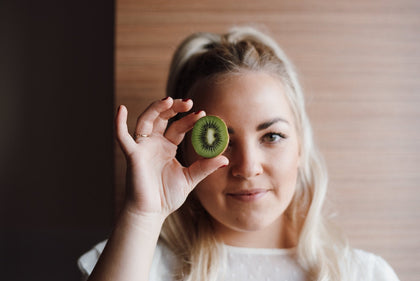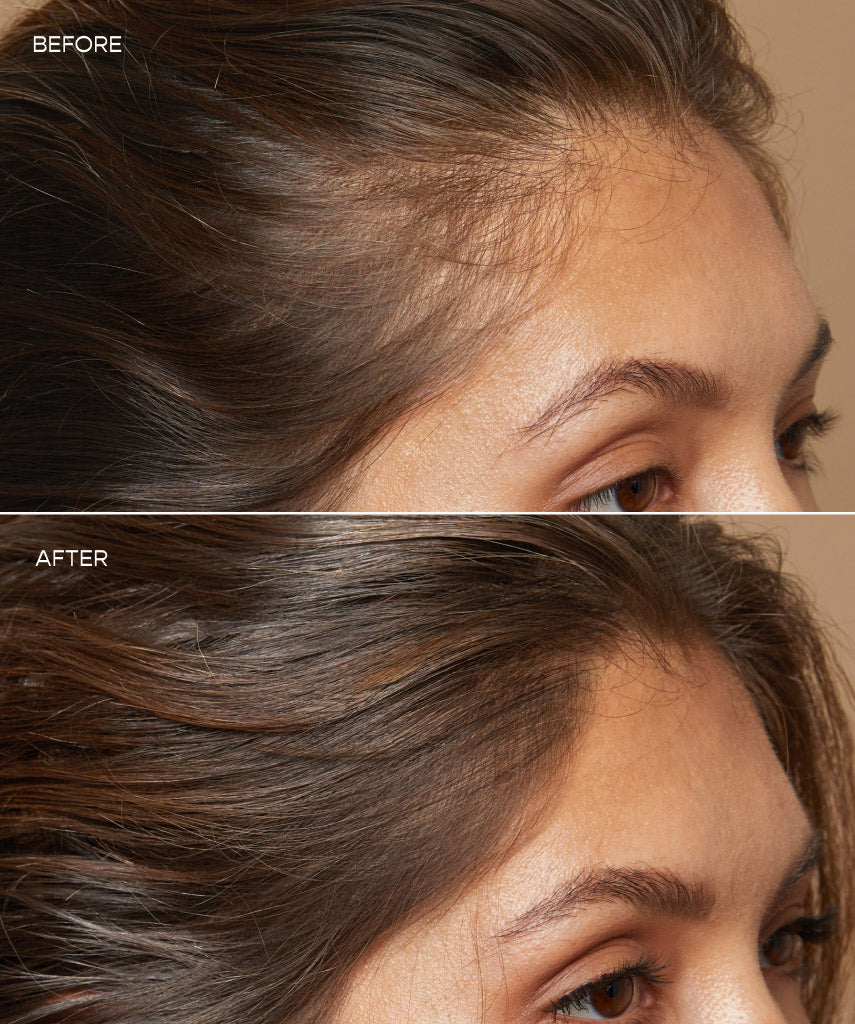Anyone who is worried about their health and wellness knows that vitamins and minerals are important for good health. There are dozens of supplements, vitamin blends and powders on the market that promise a happier, healthier you. But did you know that certain vitamins can cause hair loss?
Read on to find out which supplements might contribute to hair loss and how to navigate them — plus, find out what products you can use to encourage thicker, fuller looking hair.
How Vitamins Can Cause Hair Loss
It's true that vitamins and minerals are important for good overall health and wellness, but the over-supplementation of certain nutrients can actually lead to a hair thinning condition called telogen effluvium, also known as TE. Telogen effluvium is a temporary visible thinning or hair loss that usually occurs after stress, shock or a traumatic event. In some cases, imbalances in the body can also trigger TE.
During a normal healthy hair cycle, around 8% to 10% of the hairs on your head are in the telogen resting phase. However, when TE sets in, it extends the resting phase so that 30% or more of your hairs are in the resting phase, and new shafts are not coming in from the hair follicles. This results in a temporary increase in hair shedding.
So how do vitamins play a part in this? With the wellness industry pushing supplements to help people feel and look their best, many people are getting more than the recommended daily amount of certain vitamins and minerals. Of all the vitamins you might be consuming each day, four specific ones can trigger telogen effluvium and cause hair to shed faster than it normally would. The four main vitamins that can lead to hair thinning and loss are vitamin A, vitamin E, selenium and zinc. However, there are also a couple of others that can cause issues.
#include-related-slider#
Vitamins That Can Cause Hair Loss
"Over-supplementation of certain nutrients, including selenium, vitamin A and vitamin E, have actually been linked to hair loss," said Dr. Enrizza Factor. "Too much vitamin A can contribute to hair loss, as can too much selenium, although more studies are needed to establish the latter relationship."
Here's more about the four main vitamins that can cause hair loss when taken in excess.
Vitamin A
Vitamin A helps with normal vision, boosting the immune system, supporting reproduction and bodily growth and development. Vitamin A also helps the heart, lungs and other vital organs to work properly. Excess levels of vitamin A can lead to blurred vision, vomiting and hair loss. The recommended amount of vitamin A each day is 900 mcg for adult males and 700 mcg for adult females. The upper limit is 3,000 mcg. Foods that contain beta carotene that can easily be converted to vitamin A include carrots, sweet potatoes, mangoes, squash and spinach.
Vitamin E
Vitamin E is important for good skin, and it also helps with vision, brain function and reproductive health. However, when taken in excess, it can also lead to hair loss. The recommended amount of vitamin E each day is 15 mg for both men and women. The upper limit for vitamin E per day is 1,000 mg. Good food sources of vitamin E include leafy greens, whole grains and nuts.
Zinc
Zinc is a popular trace mineral for boosting the immune system, but too much can lead to hair loss. Additionally, when your body has a zinc deficiency, you can also lose hair. So it's important to learn how much zinc you should have in your diet. The recommended amount of zinc per day is 11 mg for men and 8 mg for women. Fortified breakfast cereals, beans, nuts and whole grains are good food sources of zinc.
Selenium
Selenium is a mineral that can help boost hair growth, but when taken in excess can cause brittle hair and hair loss. It can also lead to nausea, skin rashes and problems with the nervous system. The recommended amount of selenium each day for men and women is 55 mcg. The upper limit is 400 mcg daily. Breads and grains are good sources of selenium, as well as some plants, but it largely depends on the soil content where the plants were grown.
So we know that these nutrients are important for the body, but how can you navigate getting enough of them while also not getting too much?
Also: How Selenium Impacts Hair Loss, Growth and Grays
How to Deal With Hair Loss Related to Vitamins
Navigating hair loss that comes from over-supplementation of vitamins and minerals starts with making sure you're getting the right amounts each day and not overdoing it. The first place to start is with your diet. You'll also need to deal with stress and make sure your hair care products are helping and not harming your hair.
Evaluate Your Diet
Check your intake of foods that are naturally high in vitamins A and E, selenium and zinc.
Then check your pantry and refrigerator to see if any of your foods are fortified. The most common fortified foods on the market are:
- Breakfast cereals
- Bread
- Fruit juice
- Soy milk and other non-dairy milk alternatives
- Salt
Check the labels and packaging of your foods first to see how much of each vitamin and mineral you are taking in each day. If your foods are fortified with more minerals, vitamins and nutrients than you want to be taking in each day, switch to unfortified brands of your favorite ingredients, which will help you more accurately measure your nutrient intake.
Next, you'll want to make sure you're not overdoing it with the supplements. Remember, telogen effluvium is a temporary cause of hair loss, so once you get your vitamin amounts balanced, your hair should grow back. Make sure you're not overdoing it on vitamin A, vitamin E, selenium, or zinc.
Overall, it's better to get your essential nutrients from whole, unprocessed foods rather than relying on fortified foods. So if you're going to eliminate foods from your diet, it makes sense to start with processed options. However, consult with your doctor or nutritionist for help in making sure your body is getting what it needs.
Evaluate Your Stress Levels
High levels of stress can wreak havoc on the body and also cause hair loss, so keeping it in check is key. Making time for mindfulness practices like meditation and yoga can help you find balance. Additionally, if you're struggling with challenges in your life that go beyond the support your family or friends can provide, consider reaching out to a mental health professional.
Evaluate Your Hair Care Products
Next, you'll want to make sure your hair biome is healthy and that the products you're using aren't further stressing the body. Harmful additives like parabens, silicones and sulfates can further aggravate the hair.
This is where it can really make a difference to add some natural products to your hair health routine. If you're experiencing visible hair loss or hair shedding, plant-based products can help you fight hair loss naturally.
A spectrum of issues can contribute to hair thinning or fallout, like stress, sleep deprivation, vitamin deficiencies, over-supplementation with certain vitamins, hormonal changes, increased DHT and miRNA22 levels or poor scalp health. More often than not, it's a combination of two or more of these issues that cause hair thinning or hair loss.
Because it's often hard to peg exactly what is causing hair thinning, a holistic approach to hair health and wellness is the most effective way to cultivate a healthy hair biome.
Our plant-based GRO Hair Serum has a combination of clinically-tested, vegan phyto-actives that work in together to support a healthy and balanced follicular ecosystem while simultaneously soothing the scalp and revitalizing your hair roots. It:
- Reduces signs of shedding by up to 85%*
- Increase the appearance of hair density by up to 56%*
*Based on a 120-day independent, third-party clinical study with 40 participants using GRO Hair Serum once daily.
Vitamin Deficiencies Can Also Affect Hair
Although getting too much of certain vitamins can cause hair loss, vitamin deficiencies can also have a hair-loss effect. "Certain vitamins are essential for healthy hair growth," said hair transplant expert, Dr. Harikiran Chekuri. "A lack of these vitamins can lead to hair loss. For example, vitamin D is necessary for the body to absorb calcium, which is important for maintaining healthy hair follicles. Without enough vitamin D, the body cannot properly absorb calcium, which can lead to weak and unhealthy hair follicles and eventually, hair loss."
A Holistic Approach Is Key for Your Hair and Overall Health
For overall health, including that of your hair, a healthy, balanced diet is key. Additionally, keeping stress levels in check, getting enough sleep, exercising regularly, staying hydrated and having a hair and skincare routine that's focused on wellness are also very important.
Whether you're experiencing hair loss or not, if you feel confused about how many vitamins you should be taking each day, or if you don't think you're getting enough, talk with your doctor or a nutritionist. He or she can help you create a meal and supplement plan that works for your body and lifestyle, which can lead to a happier and healthier you!
#include-related-slider#
More From VEGAMOUR
- Shop: Thinning Hair Products
- 5 Nutrients Your Hair Needs, According to a Nutritionist
- 7 Reasons You Should Take Hair Supplements
- The Science Behind VEGAMOUR
Photo credit: Anete Lusina/Pexels
Back



















